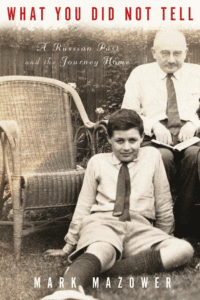What You Did Not Tell: A Russian Past and the Journey Home, by Mark Mazower, Other Press, 381 pages, $25.95
Reviewed by NEAL GENDLER
Seventy years ago, few Londoners would have guessed that quiet businessman Max Mazower, speaking flawless English, had been a Russian socialist revolutionary.

Multilingual Max had been a leader of the Bund, at its 1905 peak only about 34,000 strong, yet “the largest and most effective revolutionary force in the Tsarist empire,” says grandson Mark Mazower in What You Did Not Tell.
The Bund, formally the General Jewish Workers Union in Lithuania, Poland and Russia, was founded in then-Russian Vilna in 1897 — the same year Theodor Herzl convened the first Zionist Congress.
The Bund considered Zionism “a fantasy, and a dangerous one, at that,” Mark Mazower says. But opposition was doubly the wrong choice for Russian Bundists who — unlike Max — misread the tea leaves and remained after 1917. “Many of his closest comrades ended up in violent deaths, shot either by the Bolsheviks or the Nazis.”
Taciturn Mordchel (Max) Mazower took his revolutionary secrets to his grave, but with extensive archival research, period correspondence and interviews, Columbia University history professor Mazower has reconstructed essential parts of the story.
Young Max led a double life: dapper official at a shipping firm and anti-Tsarist agitator. By 1899, Grodno-born Max was 25 and “a member of the [Bund] directorate running the organization in its most-important town,” Vilna.
A shipping company was good cover for moving revolutionary materials. He was arrested in 1901 after five years’ involvement in printing and regionally distributing illegal Yiddish literature, forging illegal passports and buying guns and printing equipment.
After 1904, he led Bund work in Lodz, coordinating with socialist Poles and Lithuanians, the latter led by Felix Dzerzhinsky. Dzerzhinsky would turn Bolshevik and head the Cheka, the secret and security police that launched the first of three waves of Soviet terror.
Arrested for a third time 1907, Max escaped Siberian exile and eventually reached London, ending political life. Now 35, he became the very successful head of Russian sales for well-regarded Yost Typewriter.
By 1919, representing a British company in the USSR got risky, so he returned to London, eventually running the Engineering and Mercantile Co., a machine tool exporter. Later efforts in real estate were unsuccessful, making Max even less talkative, author Mazower says.
Max had married Frouma Toumarkine, a Russian Jew 20 years younger and as gregarious and hospitable as Max was quiet. They lived in leftist, anti-Communist Russian-émigré circles, unconnected with British Jewry, often host to visitors and, in hard spells, boarders.
The couple’s three children were William (Bill), the author’s father; Irena (Ira), Frouma’s daughter from an unhappy first Russian marriage, and André, likely Max’s son with ardent revolutionary Sofia Krylenko. Her brother Nicolai became Stalin’s commissioner for justice, “one of the main architects of the Bolshevik show trial.” In 1938, he was executed, victim of what he’d helped create.
Bill was a devoted, dutiful son. Independent-minded Ira was a handful who married young. Unsettled André was in and out of their lives. Bill, Frouma’s delight, led a steady life: Oxford, army, 30 years in management for Lever Brothers, father of four sons.
Several times, I asked myself why I was reading about this non-famous, if unusual family, but Mazower is a good writer and I never lost interest as he uncovered a buried past featuring the Bund, Vilna before the Great War and Max and Frouma’s relatives and relationships with well-known Russian revolutionaries, many of whom met terrible ends.
Well-designed pages include abundant photos of people and places, but too often in the tiny size of decades-ago “snapshots.” Apparently it’s become trendy to list the captions — when there are any — at book’s end, requiring an annoying back-and-forth. Readers are helped by a glossary and family trees for Max and Frouma, but hindered by lack of an index for a book flooded with names, places and events.
What You Did Not Tell is Mark’s tribute to his father and grandfather. Max’s century-ago movement “lost out and languished in oblivion,” Mazower says, but Max’s life taught that “it is what you do with defeat that counts.”
***
Neal Gendler is a Minneapolis writer and editor.



















